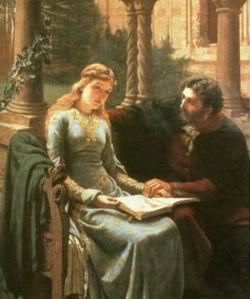
The romance of the Medieval age. And also probably the most infamous 'Student-Teacher' relationship ever. Ooh so naughty. Peter Abelard (1079-1142) was a controversial philosopher, and considered one of the greatest thinkers of the twelfth century. Heloise was the niece of Canon Fulbert, and she was twenty years younger, even naughtier. Unusually her uncle had strived for a great education for her. Abelard later writes in his "Historica Calamitatum": "Her uncle's love for her was equaled only by his desire that she should have the best education which he could possibly procure for her. Of no mean beauty, she stood out above all by reason of her abundant knowledge of letters." It turned out to be doomed however, Abelard got Heloise knocked up (had a baby called Astrolabe, cool name if you have a future child called Astrolabe I will disown you), then they got married, Abelard got Castrated, he described it as 'a most cruel and most shameful punishment, such as astounded the whole world; for they cut off those parts of my body with which I had done that which was the cause of their sorrow.' Yeowch. Let it serve as a lesson to all men, keep your naughty parts in your pants.
But: 'Two people in a relationship, tragic or triumphant, does not make a love story.there is an aspect of a marginalized woman there in Heloise, Abelard was willing to shun her. She spent her years chiding him in her letters for his faults, he probably deserved it. She was forced to join the abbey where she later became abbess, a social pariah. 'It is a tragic relationship, but it is not a love story'- Patricia Hamill. Patricia Hamil
Enough demands were made on these two by other people in their own time, they do not need the demands of a contemporary feminist judgement disturbing our, perhaps rose tinted view of their romance. Sure their love may seem stunted by modern terms but they both really suffered for something that they felt they couldn't live without, they had an illegitimate child, genitals were lost and religion was embraced, really they were just two very unlucky individuals when it came to a happy ending, but maybe they were just really lucky to have felt love that strong that people just don't seem to feel now-a-days. I am jealous of that.
Both Peter Abelard and Heloise continued to go on living, to write, to love, to contribute to our literary history. They didn't kill themselves, or marry anyone else (unless you count the fact that both married the church). Heloise asks for his words, saying: "While I am denied your presence, give me at least through your words--of which you have enough and to spare--some sweet semblance of yourself." She ends the letter with: "I beg you, think what you owe me, give ear to my pleas, and I will finish a long letter with a brief ending: farewell, my only love."
To her passionate letters, he responds in part: "If since our conversion from the world to God I have not yet written you any word of comfort or advice, it must not be attributed to indifference on my part but to your own good sense... I did not think you would need these things..." How do two lovers part after such a short time, with such a terrible end and no real beginning? They had been so close. And, then their only link is through their letters, and the works that Abelard left behind. Heloise speaks of losing Abelard: "But if I lose you, what have I left to hope for? Why continue on life's pilgrimage, for which I have no support but you, and none in you save the knowledge that you are alive, now that I am forbidden all other pleasures in you and denied even the joy of your presence which from time to time could restore me to myself?" I love the idea that they needed each other to be who they really are, that is love, complete honesty in the face of another person.
Awh. Cute.More, Dissecting the Top Ten Romances of All Time?
10.Romeo and Juliet
9. Pride and Prejudice

No comments:
Post a Comment